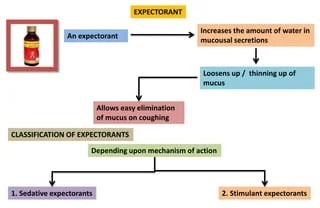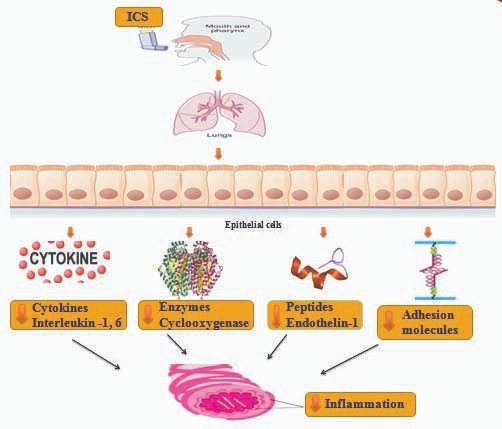A nurse is teaching a client about taking an expectorant to treat a cough. The nurse should explain that this type of medication has which of the following actions?
Reduces inflammation
Dries mucous membranes
Stimulates secretions
Suppresses the urge to cough
The Correct Answer is C
Expectorants are medications that help to loosen and thin mucus in the respiratory tract, making it easier to cough up and expel. They work by increasing the production of respiratory tract secretions, which helps to hydrate and thin the mucus, making it less sticky and easier to clear from the airways. By stimulating the production and secretion of mucus, expectorants promote coughing and facilitate the removal of excess mucus and phlegm from the respiratory system.
It's important to note that expectorants are primarily used for productive coughs (coughs that produce phlegm or mucus). If the cough is dry and non-productive, other types of cough suppressants or remedies may be more appropriate.
Regarding the other options:
Reduces inflammation: Expectorants do not have a direct effect on reducing inflammation in the respiratory tract. Anti-inflammatory medications such as glucocorticoids are typically used for reducing inflammation in conditions like asthma or chronic obstructive pulmonary disease (COPD).
Dries mucous membranes: Expectorants do not have a drying effect on mucous membranes. In fact, they work to increase the hydration and fluidity of respiratory secretions.
Suppresses the urge to cough: Expectorants do not suppress the urge to cough. They promote coughing by facilitating the clearance of mucus and phlegm from the airways. Cough suppressants, on the other hand, are medications used to relieve a dry, non-productive cough by suppressing the cough reflex.

Nursing Test Bank
Naxlex Comprehensive Predictor Exams
Related Questions
Correct Answer is A
Explanation
Inhaled fluticasone (Flovent) is a corticosteroid medication that is commonly used in the treatment of asthma. It works by reducing inflammation in the airway, which is a key component of asthma. By decreasing inflammation, it helps to prevent and control asthma symptoms, such as wheezing, coughing, and shortness of breath.
The other options mentioned are incorrect:
B. Relieves symptoms of an acute asthma attack: Inhaled fluticasone is not intended for immediate relief during an acute asthma attack. It is a long-term control medication used to manage and prevent asthma symptoms.
C. Causes immediate bronchodilation: Fluticasone does not cause immediate bronchodilation, which refers to the widening of the airways to improve breathing. Bronchodilation is typically achieved with short-acting beta-agonist medications, such as albuterol.
D. Reduces blood pressure and heart rate: Fluticasone is not known to have a direct effect on blood pressure or heart rate. Its primary action is to reduce inflammation in the airway for the management of asthma.

Correct Answer is C
Explanation
Dimenhydrinate is an antihistamine commonly used to treat motion sickness and vertigo. One of the common side effects of dimenhydrinate is dizziness. It can cause sedation and impair cognitive and motor functions. Therefore, the client should be advised to be cautious when engaging in activities that require alertness, such as driving or operating machinery. Monitoring for dizziness and taking appropriate precautions can help prevent accidents and ensure the client's safety.
The other options provided in the original response are incorrect:
- Administer 24 hr before effects are desired: This is not a correct instruction for dimenhydrinate. The medication is typically taken 30 minutes to 1 hour before the desired effects, such as before travel to prevent motion sickness.
- Expect an increase in salivation: Dimenhydrinate does not typically cause an increase in salivation. This is not a known side effect of the medication.
- Observe for diarrhea: Diarrhea is not a common side effect of dimenhydrinate. While gastrointestinal disturbances can occur with some antihistamines, it is not typically associated with dimenhydrinate use.
Whether you are a student looking to ace your exams or a practicing nurse seeking to enhance your expertise , our nursing education contents will empower you with the confidence and competence to make a difference in the lives of patients and become a respected leader in the healthcare field.
Visit Naxlex, invest in your future and unlock endless possibilities with our unparalleled nursing education contents today
Report Wrong Answer on the Current Question
Do you disagree with the answer? If yes, what is your expected answer? Explain.
Kindly be descriptive with the issue you are facing.
